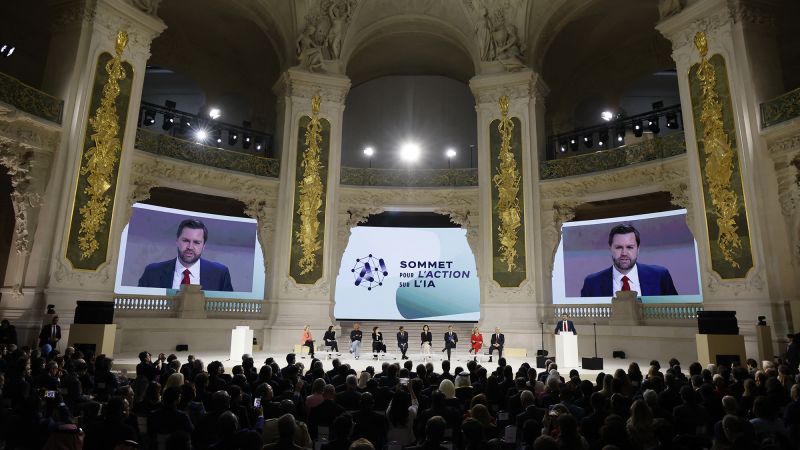In a significant address delivered at the Artificial Intelligence Action Summit in Paris, U.S. Vice President JD Vance emphasized that unduly stringent regulations could jeopardize the burgeoning artificial intelligence (AI) industry. Vance’s remarks reflected a broader initiative by the Trump administration to promote AI development on a global scale while cautioning against excessive oversight that could stifle innovation. He expressed his optimism that discussions at the summit would adopt a deregulatory stance that embraces transformative technological advancements, pointing out that high-achieving sectors are often hindered by imposing regulatory frameworks.
Vance’s comments came on the heels of the Trump administration’s recent decision to negate a comprehensive executive order established by former President Joe Biden. This order aimed to address the national security threats posed by AI and prevent potential biases in AI algorithms. “I’m not here this morning to talk about AI safety,” Vance stated plainly, pivoting the conversation towards the fruitful opportunities presented by AI. His assertion highlighted the administration’s inclination to foster an environment conducive to innovation rather than stifle it through stringent regulatory measures.
Although Vance underscored the positive aspects of AI technology, he did not eschew the potential dangers it brings. Many experts have raised concerns over the misuse of AI in generating deceptive content, including fabricated images, audio, and video that could mislead the public or even manipulate important societal processes such as elections. The risks extend to potential threats posed by AI in the form of creating autonomous weapons that could harm global stability, as noted by Manoj Chaudhary, the Chief Technology Officer of Jitterbit, a U.S.-based software firm. Such concerns echo a report from the U.S. State Department that highlighted urgent national security threats and called for regulatory measures to mitigate these risks.
While promoting innovation, Vance clarified that addressing safety concerns remains crucial to the administration’s approach. He made it clear that while the focus is on unearthing opportunities presented by AI, such as enhancing the productivity and well-being of citizens, safeguarding those interests is also a significant priority. Vance stated, “Focus matters, and we must focus now on the opportunity to catch lightning in a bottle, unleash our most brilliant innovators and use AI to improve the well-being of our nations and their peoples with great confidence.” This sentiment reinforces the administration’s commitment to tread carefully, encouraging innovation while recognizing the inherent risks of the technology.
As part of the administration’s broader strategy, Vance mentioned the necessity for U.S. schools to equip students with the skills to manage and interact with AI tools as they become an integral part of everyday life. His conviction that AI will augment rather than replace human labor signifies a forward-thinking perspective on technology’s role in society. AI, in his view, stands to complement human effort by fostering productivity rather than displacing the workforce.
A notable point of contention was the European Union’s regulatory framework for AI, which imposes sweeping restrictions on certain AI applications. The EU AI Act prohibits any biometric technologies used to assess personal characteristics such as race or political affiliations, reflecting a cautious approach to regulation that Vance argued could inhibit innovation. He called for more optimism and a collaborative attitude towards AI development, particularly from European regulators, emphasizing that regulation should not be the overriding strategy for ensuring safety or ethical use of technology.
Vance concluded his remarks by reaffirming the Trump administration’s dedication to preserving America’s competitive advantage in AI development. He indicated that future U.S. technology initiatives would focus on building advanced AI systems domestically, utilizing American-manufactured components, and also ensuring that such technologies uphold democratic values by remaining impartial and protecting free speech. In this context, the administration is poised to carve out a path forward in the rapidly evolving landscape of artificial intelligence, balancing the potentials of the technology with the imperative of regulation.



